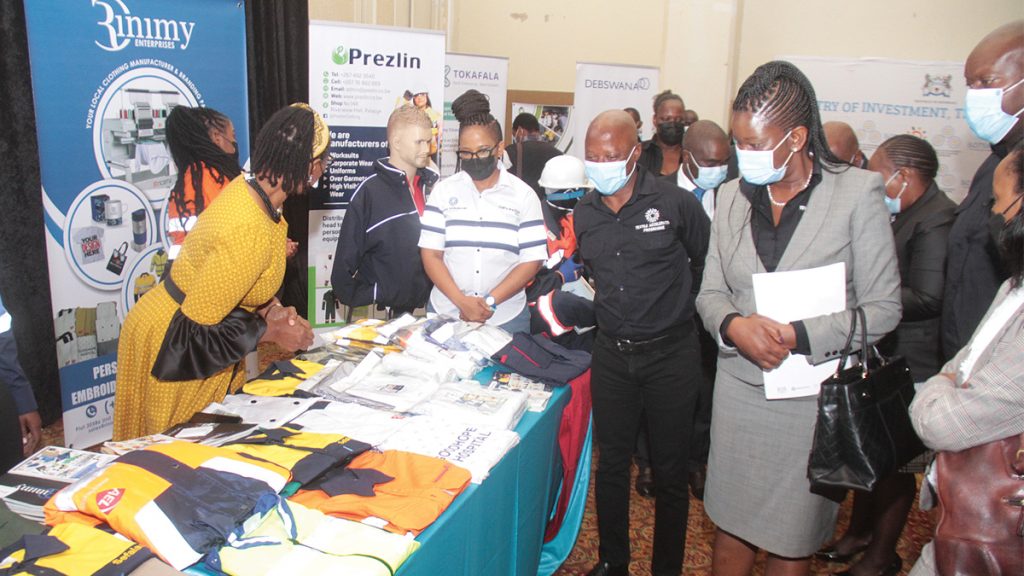- Invests P4m to bolster PPEs production in Botswana
- 34 SMMEs in textile sector geared for growth
- Debswana, LEA & Tokafala partner to revive the industry
BAKANG TIRO
The local textile industry which has been under immense downward path is poised to rebound following the P4 million investment in the sector by Debswana Diamond Company.
The blue chip mining company in partnership with the Local Enterprise Authority (LEA) and the Tokafala Enterprise Development launched Textile Accelerator Programme targeting 34 Small Medium and Micro Enterprises ( SMMEs) locally specifically for the manufacturing of the PPEs.
Head of Technical Services at Debswana, Bakani Motlhabani said Debswana spends over P10 million on Personal Protective Equipment (PPEs) yearly, indicating that the SMMEs will gain a lot financially from the initiative.
“The PPE space is of particular importance to us at Debswana because we are a company that puts safety first and we are indeed required by Law, as guided by the Department of Mines, to wear PPE at our operations to ensure the safety of our employees and contractors. Absolute Zero Harm remains one of the cornerstones of our business,” said Motlhabani.
He underscored that Debswana remains committed to citizen economic empowerment and job creation as espoused in its 2024 One Dream, One Team Business Strategy to unlock the economy.
Through the Socio Economic Development Programme, Debswana aims to create and support 20 000 jobs by the end of 2024. Debswana is one of the country’s largest employers after the government.
“Our Socio-Economic Development programme covers Corporate Social Investment, Citizen Economic Empowerment Programme and Enterprise Development. In 2021, we created and supported over 15 000 jobs. Through this Textile Accelerator Programme, since its inception in 2020 when we engaged 60 textile operators to produce facecloth masks, we supported 549 Jobs,” he added.
For her part, Tokafala Programme Director Montle Phuthego said the model that they adopted for the project was to cluster enterprises to improve their productive capacity so to be competitive.
“We realised that since the majority of them are so small, and this also goes for the majority of citizen owned enterprises in this country, it would take them ages to reach a level where they can build sufficient productive capacity that enables them to supply large contracts. We realised that if they combine their productive capacities then they are able to reach the levels similar to those of large enterprises,” she said, adding that 85% of businesses featured on the accelerator are owned by women.
In addition, Phuthego said the Tokafala programme was able to use the masks project amidst the Covid-19 pandemic to shift to the PPEs, adding that the project can also suit other sectors.
Phuthego singled the agriculture sector as one that needs to be fully exploited.
She is optimistic that the textile accelerator programme will be able to close the leakages on the import bill as the importation of manufactured goods is also gobbling huge chunks of money.
LEA UPBEAT
The Chief Executive Officer of LEA Dr Racious Moatshe said the private sector is key for growth.
Moatshe, who is steadfast developer of SMMEs, said as the individuals holding positions of authority within Government and private sector they are appropriately placed to help Government implement programmes that can effectively create jobs, empower SMEs and aid economic growth.
“In order to amongst others, tackle unemployment which is more predominant amongst the youth, reduce import bill, achieve an export and private sector led economy, and leverage on opportunities offered by technology and innovation, the government of Botswana has come up with a good number of initiatives and legal instruments namely, The Reset Agenda Restrictions of Imports for Specified Horticulture Products and Revised PPADB Act etc.,” said the upbeat Moatshe.
He said this PPE project will result in a total procurement value of P30 million for the next three years.
“For a mine the size of Debswana, this represents 40% of their PPE procurement. The other 60% of the procurement covers other PPE products that are not in the targeted list and for us as LEA, we consider those as business opportunities for uptake by SMEs given that some of the items within the remaining 60% are imported,” said Moatshe.
